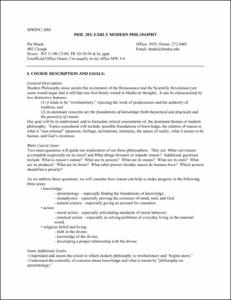Please use this identifier to cite or link to this item:
http://hdl.handle.net/10267/3495Full metadata record
| DC Field | Value | Language |
|---|---|---|
| dc.contributor.author | Shade, Patrick A. | - |
| dc.date.accessioned | 2009-02-26T17:15:22Z | - |
| dc.date.available | 2009-02-26T17:15:22Z | - |
| dc.date.issued | 2005-01-14 | - |
| dc.identifier.uri | http://hdl.handle.net/10267/3495 | - |
| dc.description | This syllabus was submitted to the Rhodes College Office of Academic Affairs by the course instructor. | en_US |
| dc.description.abstract | General Description: Modern Philosophy arose amidst the excitement of the Renaissance and the Scientific Revolution (yet some would argue that it still had one foot firmly rooted in Medieval thought). It can be characterized by two distinctive features: (1) it tends to be “revolutionary,” rejecting the work of predecessors and the authority of tradition, and (2) its dominant concerns are the foundations of knowledge (both theoretical and practical) and the power(s) of reason. Our goal will be to understand, and to formulate critical assessments of, the dominant themes of modern philosophy. Topics considered will include: possible foundations of knowledge, the relation of reason to what is “non-rational” (passions, feelings, inclinations, instincts), the nature of reality, what it means to be human, and God’s existence. Main Course Issue: Two main questions will guide our exploration of our three philosophers. They are: What can reason accomplish (especially on its own)? and What things threaten or impede reason? Additional questions include: What is reason’s nature? What are its powers? What are its means? What are its ends? What are its products? What are its limits? What other powers besides reason do humans have? Which powers should have priority? | en_US |
| dc.language.iso | en_US | en_US |
| dc.publisher | Memphis, Tenn. : Rhodes College | en_US |
| dc.relation.ispartofseries | Syllabi CRN | en_US |
| dc.rights | Rhodes College owns the rights to the archival digital images in this repository. Images are made available for educational use only and may not be used for any non-educational or commercial purpose. Approved educational uses include private research and scholarship, teaching, and student projects. For additional information please contact archives@rhodes.edu. Fees may apply. | - |
| dc.subject | Philosophy, Department of | en_US |
| dc.subject | Syllabus | en_US |
| dc.subject | Curriculum | en_US |
| dc.subject | Academic departments | en_US |
| dc.subject | Text | en_US |
| dc.subject | 2005 Spring | en_US |
| dc.title | PHIL 203-01, Early Modern Philosophy, Spring 2005 | en_US |
| dc.type | Syllabus | en_US |
| Appears in Collections: | Course Syllabi | |
Files in This Item:
| File | Description | Size | Format | |
|---|---|---|---|---|
| 2005_sp_PHIL_203-01.pdf | 114.26 kB | Adobe PDF |  View/Open |
Items in DSpace are protected by copyright, with all rights reserved, unless otherwise indicated.